Year Zero: the season that made Thierry Henry at Arsenal (1999/2000)
On this day 20 years ago, Arsenal changed forever. But things weren't so easy for the Frenchman: in his first season at Highbury, a doubt-riddled 22-year-old came close to giving up on himself. Then everything changed...
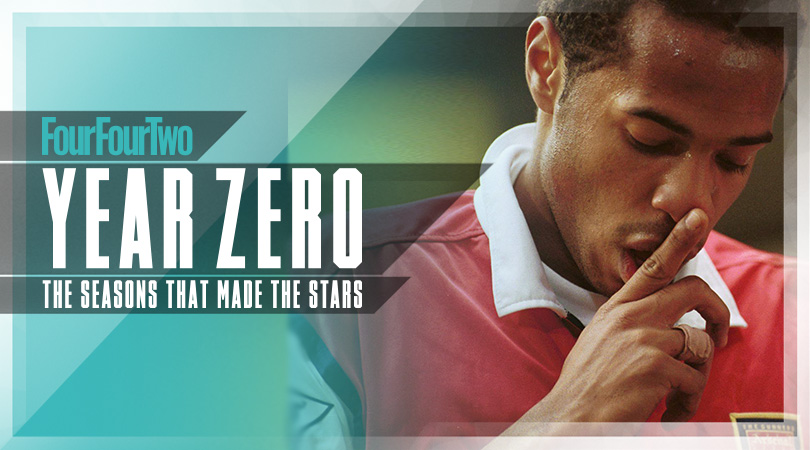
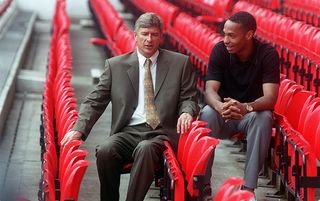
Thierry Henry knew something needed to change. His decision was made – that morning he would go into Arsene Wenger’s office at London Colney and tell his manager that he didn’t want to be a striker anymore.
Nobody would have minded anyway; not the fans who’d been disappointed with the 22-year-old’s first months at Arsenal, and least of all Henry himself, his confidence shot to bits after a tough start to life in north London. Patrick Vieira was teasing him about his profligacy, but deep down it hurt.
Besides: he was a winger, wasn’t he? Coltish, graceful, direct – it suited his style. It was where he’d played for Monaco with success; for France at the 1998 World Cup – where he top scored for his country – and then for Juventus. That’s just how everyone knew him, and how he too recognised himself.
But Henry didn’t go into Wenger’s office that day, and never told him that he didn’t want to be a striker anymore. By the time he arrived for training he’d changed his mind. Let’s give this another try, he thought.
Arsene always knew best. When he signed Henry from Juventus for a club record £11m in August 1999, it was always with the intention of him playing up front eventually.
Wenger had told Henry that he wanted to sign him while on a flight from Italy to Paris a few months earlier, an apparently chance meeting between the pair in which the bespectacled Gunners boss is said to have reminded the youngster: “You are wasting your time on the wing. You are a No.9.”
He’d actually wanted to snare Henry before he joined Juventus, but the Italian side had deeper pockets. The player called Wenger 30 minutes before signing on the dotted line, by which point it was too late to intervene.
Get FourFourTwo Newsletter
The best features, fun and footballing quizzes, straight to your inbox every week.
His old manager had always been the man to recognise Henry's potential at Monaco, where Wenger handed a barely 17-year-old his senior debut, only to be sacked just 17 days later for the team’s poor start to the 1994/95 season.
Henry had been a prolific striker at youth level, where goals came easily at a time when, in his words, he felt like “a real striker”. But he was still considered too raw to inflict the same damage in the first team. Monaco also had the deadly Brazilian Sonny Anderson to lead their line back then, so Henry spent his early days playing on the left wing where his best attributes could be exploited. Gradually, his natural position had become unnatural.
By the time he arrived at Arsenal, though, two weeks before his 22nd birthday, Henry had more than just a challenging position switch to contend with. The Gunners were reeling from the unscrupulous exit of Nicolas Anelka to Real Madrid for £23m, and needed to replace their top scorer who’d been only a goal away from sharing the Premier League Golden Boot in 1998/99.
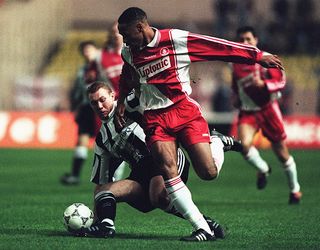
Arsenal had signed France ‘98 hero Davor Suker for £3.5m the day before Henry’s arrival, but the Croatian was neither young nor French. It was Henry, therefore, who faced comparisons with Anelka from the off – he’d been a year ahead of his compatriot at Clairefontaine, though considered slightly less talented, and the pair were friends despite Anelka having been partly responsible for Henry’s demotion to France’s under-21 squad by this point.
Henry was unperturbed by the links in early interviews; Wenger, meanwhile, was bullish in a thinly veiled dig at Anelka. “If you don’t want comparisons you should stay at home,” noted the Gunners chief. “If you want to be a big player, you go out and show it on the pitch. He has the qualities to do as well as Nicolas. Thierry is much more of an extrovert than Nicolas was. He is a team player who will work hard for the whole team.”
But the new star was already arriving at Highbury short of confidence. Henry’s time at Juventus was no raging success, but his struggles in Turin are certainly overblown; for starters he’d only joined in mid-January 1999, when the Old Lady were 10th in Serie A and desperately struggling for goals – just 18 scored in 17 matches. He’d signed under Marcello Lippi, but the coach was on his way out three weeks later.
Henry started 12 of the 14 games he was available for under new boss Carlo Ancelotti. “And in the last five or six, I either scored or set up a goal,” he later told FourFourTwo. “One or the other. It’s true that it took me a few games to get used to the system, because we played a 3-5-2 I wasn’t used to, but I soon adapted and started to play well.”
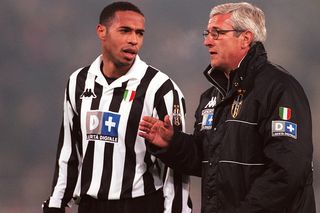
Expectations were high for a reason, though: despite his tender years, Henry had already played in the semi-finals of the UEFA Cup and Champions League, won Ligue 1, plus the World Cup with France (though he didn’t get on in the final thanks to Marcel Desailly’s sending-off).
By the time he'd arrived at Arsenal in August, that early self-doubt stemmed mainly from his lack of previous playing time up front. As Henry recalled later that season: “I had to be re-taught everything about the art of striking.”
There was a little more to it than that, though: those previous achievements felt like very little to him when turning up to play alongside his new team-mates in north London. “Although I arrived a world champion, I was nobody,” he admitted. “And rightly so. I hadn’t won anything at Arsenal, so who was I? I was just a follower at the beginning.”
Henry’s early days at Arsenal are synonymous with the simple fact that he didn’t score in his first eight appearances. In mid-September he memorably broke his deadlock at The Dell with a 79th-minute winner against Southampton that came only eight minutes after he’d been introduced off the bench. So too had his marker: Saints’ Hugo Almeida was making his debut for the injured Claus Lundekvam, and was soon being turned by Henry to help the Frenchman open his account with a lovely curled finish beyond Paul Jones.
Henry didn’t start Arsenal’s next game four days later, a Champions League group stage tussle against AIK Solna at Wembley, but again came off the bench to set up Suker for a goal and round off the scoring himself in a 3-1 win.
Still, though, the comparisons with his predecessor wouldn’t go away. According to The Times, Henry was “still snatching at chances that Anelka would have converted”. One of those was an easy early miss from close range. “If we hadn’t won the game I would have felt as if I’d let everyone down,” he said post-match. “I looked at the clock and knew I had nine minutes to put it right.”
He did, of course, but those niggly thoughts ate away at him throughout his first four months at Highbury: Henry had netted only twice in his first 17 games in all competitions, and the situation was bringing him down.
Outwardly he preached patience, but the reality that followed was seven more scoreless games after that Solna win. At this point he was still being played out wide. “I think the boss wants me to play in a more central role,” Henry reiterated. “That’s fine, but it means having to learn about timing your runs in a completely different way. That takes time.”
The turning point for Henry’s first season at Arsenal wasn’t even a game he scored in, or even made a direct contribution to a goal for that matter. It came on November 25, 1999, in a UEFA Cup first-leg tussle against Nantes; the Gunners had failed to get out of their Champions League group, and thus found themselves in the third round of Europe’s secondary competition. Henry had replaced Freddie Ljungberg with Arsenal 1-0 up and 20 minutes remaining at Highbury, and although he couldn’t add to his miserly Gunners tally, the young Frenchman looked lively and carved out numerous chances off his own back.
Wenger saw his window of opportunity – in the next Premier League game against Derby three days later, he would play his young Frenchman up front alongside Dennis Bergkamp for the first time. Henry was excited, and knew this was his big chance to prove to himself that he could do it. But he didn’t want to let anyone down – especially Wenger, his biggest backer and “spiritual father”.
By the time Henry was substituted in the 72nd minute, it was to a standing ovation. Arsenal had gone behind inside two minutes to Dean Sturridge’s shock opener at Highbury, but Henry dragged Wenger’s side level with an effortless finish nine minute later, then scored what turned out to be the winner with a beautifully composed effort six minutes into the second half.
The following day's Times described the goals as ones “of classic beauty, combining pace with sureness of touch and swiftness of eye [that] showed the Arsenal following he can finish”. Henry later reflected on them as the goals of a “proper striker”. Wenger declared it “the start, I hope, of the conversion back”.
The same day, Nicolas Anelka had refused to play for Real Madrid against Celta Vigo, claiming (with nobody’s confidence) that he had hurt his knee. Four months into his first season at the Bernabeu, he was without a goal – a run that would continue through to February 26.
Henry, meanwhile, had still been using public transport to get around six months into his debut campaign at Arsenal, marvelling at the fact he could get the train home after a game if he needed to (“If I was in France, it would be impossible to do that”) and enjoying fans’ double-takes on the tube. But that wouldn’t last much longer – his season was gathering steam at a rapid rate.
Two games after Derby, he scored the equaliser against Wimbledon, following that up soon after with an assist for Kanu and goal of his own in a 2-0 win over Leeds. “He would not have scored that three months ago,” said Wenger, who was now far from alone in recognising the Frenchman’s capacity to play up front.
Nobody’s match reports were mentioning Anelka anymore. On January 15, he bagged twice in a 4-1 thumping of Sunderland, twice making a fool of 37-year-old former Gunner Steve Bould in what proved to be an embarrassing match-up. Two games later, a belting half-volley at Bradford took his tally to eight goals in 10 matches.
For the last two-and-a-half months of the 1999/2000 season, Henry was virtually unplayable. Arsenal were motoring along through the UEFA Cup, dismantling Deportivo La Coruna and Werder Bremen to reach the semi-finals, with their new French talisman plundering five goals in those four matches.
His first net-rippler against Bremen kick-started a dazzling run of goals in 10 consecutive matches for Arsenal, broken up only by a harsh red card against the German side that forced him to miss the semi-final first leg against Lens, and a brief two-game hiatus through injury. Those goals included a winner from the penalty spot in his first north London derby against Tottenham, and a terrific double against Chelsea.
This was the Henry that Arsenal fans eventually came to know and love for seven more seasons; a player who boasted “running of feline grace” according to one writer, caressed shots beyond goalkeepers at will, and whose fearsome mentality consistently pushed him above his peers. “He is like a boxer,” Wenger said after he’d returned from the treatment table with his two goals against Chelsea. “He’s got a strong build and he’s 22. He can push anyone in the world aside.”
Like Marcel Desailly, for example. Watch at 3:30
Henry’s season didn’t end quite as hoped – not even the Frenchman in his red-hot form could help Arsenal see off Galatarasay in the UEFA Cup final, as the Turkish side won on penalties. And though history shows they finished second in the league that year, the title was never realistic – Wenger's men were out of the race by Christmas, and ended 24 points behind a dominant Manchester United (but some 15 ahead of third-placed Leeds).
This, though, was still the season in which Wenger’s doubt-riddled apprentice became a self-empowered assassin, beginning a love affair with Arsenal that would last well beyond his departure to Barcelona in 2007. By the time he'd returned to pre-season training for his second season in north London, Henry was a European Championship winner with France having started five of Les Bleus' six games – three of them alongside Anelka – and scored three times en route to their latest international triumph.
“I don't like fixing myself specific goals, because there's no point in putting yourself under pressure,” Henry had said in mid-December 1999, two weeks after he’d put Derby to the sword with his long-awaited return to life up front. “Having said that, I want to be remembered as a great player.”
If only you knew, Titi.
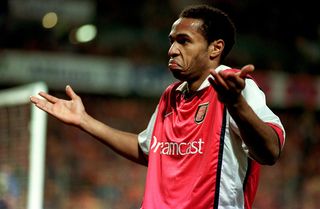
While you're here, why not take advantage of our brilliant subscribers' offer? Get 5 issues of the world's greatest football magazine for £5 – the game's greatest stories and finest journalism direct to your door for less than a pint in London. Cheers!
Liked this? More from Year Zero...
Joe was the Deputy Editor at FourFourTwo until 2022, having risen through the FFT academy and been on the brand since 2013 in various capacities.
By weekend and frustrating midweek night he is a Leicester City fan, and in 2020 co-wrote the autobiography of former Foxes winger Matt Piper – subsequently listed for both the Telegraph and William Hill Sports Book of the Year awards.
